The new elder statesman on the Danish national badminton team is mixed doubles star Joachim Fischer Nielsen, spoke to Badzine during a break from his 5th World Championship campaign in Guangzhou, China.
By Don Hearn, Badzine Correspondent live in Guangzhou. Photos: Badmintonphoto (live)
The Danish national badminton is always packed with players who are long on experience and durability. Joachim Fischer Nielsen seems now to be the man with the most of both, with versatility thrown in for good measure.
An accomplished singles and men’s doubles player for many years, Joachim made the jump to mixed doubles just in time, it seems, to become one of the major challengers to the current phase of Chinese domination of the discipline.
Winner of eight Superseries titles, including two Superseries Finals victories, Joachim Fischer Nielsen and his partner Christinna Pedersen lost out narrowly to the eventual gold medallists at last summer’s London Olympic Games, and ended up with the bronze medal.
Now with the retirement in the last two years of veterans like Peter Gade, Jonas Rasmussen, and Thomas Laybourn, among others, Joachim is the most experienced player who has stayed with the Danish team and making a run for Rio in 2016. He spoke to Badzine shortly after winning his opening match at the World Championships in Guangzhou.
Badzine: You are now the eldest among the Danish players but that is a new position for you. Does it affect you in any way?
Joachim Fischer Nielsen: Yeah, now the younger players are calling me ‘the old one’. It was Peter before he stopped but now it’s my turn. It’s not something that I think about too much but it’s just the younger players are telling me that I’m getting older and older. That’s how it is.
Badzine: You are one of many players who have made the switch from singles to doubles. What was that switch like for you?
Fischer Nielsen: Of course I’m happy that I made the switch because I made much better results after switching to men’s and mixed doubles. The former Danish national team coach Steen Pedersen was the guy who was telling me that I should try to play the mixed doubles and I hadn’t played mixed before 2007. You can say that I owe him a thanks because I am very happy with the choice that I made back then.
Badzine: You and your first partner, Britta Andersen suffered a huge setback early on, though, correct?
Fischer Nielsen: Yes, it was just a few months before the Olympics. We had been playing together for a year and had already qualified for Beijing. It was a very sad thing, especially for her but also in some way for me because I had to start over again with a new partner.
Back then, I wanted to work with Christinna because she was very young and she wanted to work hard. We found out very fast that we had a high level.
Badzine: You have also had your share of problems with injuries too, haven’t you?
Fischer Nielsen: Of course, I have had two knee operations. Actually, the last year and a half, I have been working with Henrik, who is my physiotherapist but also my personal assistant. He works a lot with me and I owe him a lot of gratitude for keeping my legs and especially my knees fresh. I don’t think I could have played without him, if I hadn’t met him and that’s also why he is here with me at the World Championships.
Badzine: You and Christinna Pedersen seem to have had more success against the top two Chinese pairs – Xu/Ma and Zhang/Zhao – than perhaps any other pair. What is the secret to beating them?
Fischer Nielsen: I don’t think there is a secret but the main thing is that Christinna and I have beaten them before and so we know that we can beat them. I think that a lot of the other pairs, when it comes to the two top Chinese, they just don’t believe that they can win against them.
You can say that Christinna and me, we are almost only training so we can try to beat them. That is our target all the time: to beat those those two pairs. We know that they are so strong but we also know that we can beat them and if we are in top form, then we always have a chance.
Badzine: In the last few years, we have seen many players struggle with working within their national badminton associations and many have decided to turn professional. Do you have any thoughts on which system works best?
Fischer Nielsen: There are both ways also in Denmark. A half a year ago, myself and a number of other top players were not very far from leaving the national team. We wanted to go to the Indian League and our federation didn’t want us to go. So we also have some challenges in our system.
It is strong in Denmark but you can say that some of the old players, we have been working very hard for many years and we also want to earn some money here in the last couple of years so we also have some when we stop. That is a challenge in Denmark because we are not funded that much and we have to find our own money.
When I have Henrik with me, I’m paying on my own so that is a challenge. We have to work hard to find our sponsors on our own and when there is an Indian league that would like to pay lots of money for us to go there, then of course, we would like to go.
Badzine: Would you say the answer is for the national associations to step up and simply provide more funding or simply that players should be given the freedom to see sponsorship on their own?
Fischer Nielsen: I think it’s difficult in Denmark because you have Team Denmark, which is sponsoring all the athletes and for all the players and all levels of the system, from the juniors, we don’t have that much money.
So it is a challenge and that is also why it is a good thing that we have been allowed to find our own sponsors. If not for that, I think a lot of players would have stopped already because we also like to be able to do some of living a sort of normal life. That is life for Denmark. We don’t like to be staying in a centre every day. We like to work and do some studies.
So I think the system is good but I think we have to work even harder to get some more funding so that the younger players can play more tournaments.
Badzine: You mentioned working. Can you actually play at the level you do and still hold down a steady day job?
Fischer Nielsen: For a few years, I also had a job while I was still playing badminton. Now that I’m training so much and playing so many tournaments and I have a little boy also, then I stopped working because I also wanted to spend time with my family when I’m not training or travelling.
I thnk it’s a good idea to see some other thingsin life and also to get some different eyes on life, not only on badminton. That’s important to be, you might say, a normal person but also of course, we have to do something else when we stop because we don’t have so much money from our sport.
Badzine: Unlike if you were tennis players, for example?
Fischer Nielsen: [laughs] Yeah, I think they have it a little bit easier.
Badzine: Speaking of tennis, it seems the Superseries Premier level of events was introduced in an attempt to emulate the Grand Slam in tennis. Do you think that this change has worked overall?
Fischer Nielsen: I actually think it has worked but still we have too many important tournaments in our season. But I think that the efforts have worked. In the last few years, I have been able to feel that our sport has been getting even bigger, even bigger all the time.
Especially here in Asia, a lot of people also know us and I feel that it’s going the right way. I also think that almost everywhere we play, there are so many spectators and that must be a good thing and that must be that people like the sport more and more.
Badzine: Would you say then, that the number of spectators is increasing?
Fischer Nielsen: In Indonesia, we are always playing to a full house. Also here in China, once we get to the last rounds, there is almost always a full house. Malaysia this year was also a full house. It’s a great pleasure for us to play when so many people are coming and watching.
Badzine: You mentioned that the focus of your training is on working to try to beat the top two Chinese pairs. How do you fancy your chances at these World Championships?
Fischer Nielsen: I think we have a good chance to win the next two rounds but as it is, in mixed doubles, we cannot underestimate any pairs. The Koreans are strong, the Taiwan and Indonesian players are also very strong, but we have tried to come as prepared as possible. I had some injuries before the tournmanet but I feel that I’m there now. I think that Christinna and I believe we can make a good result but we still need to keep our feet on the ground and also to have good respect for the pairs we are playing.
![Joachim Fischer Nielsen: Denmark’s new voice of experience The new elder statesman on the Danish national badminton team is mixed doubles star Joachim Fischer Nielsen, spoke to Badzine during a break from his 5th World Championship campaign in […]](http://www.badzine.net/wp-content/uploads/Newsflash-thumbnail.png)
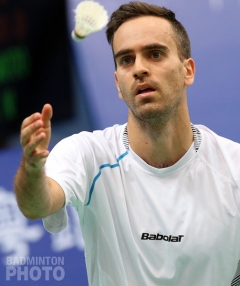
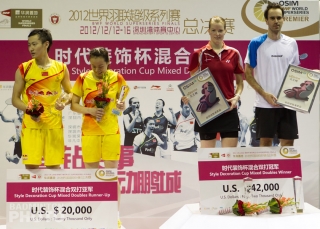
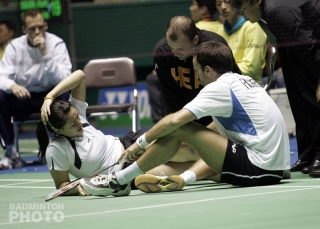
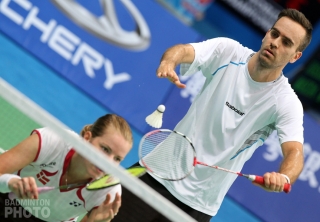
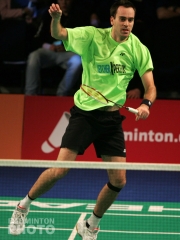
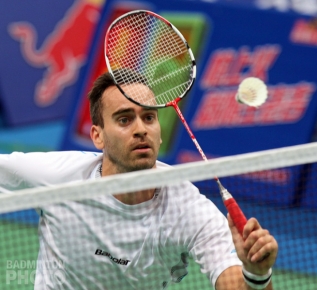

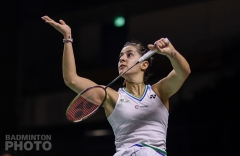
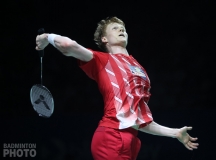
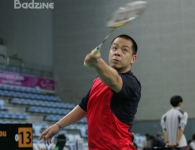
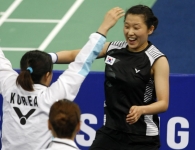
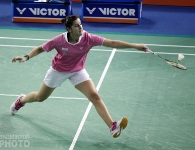
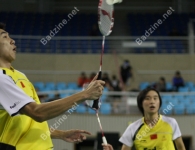
Leave a Reply